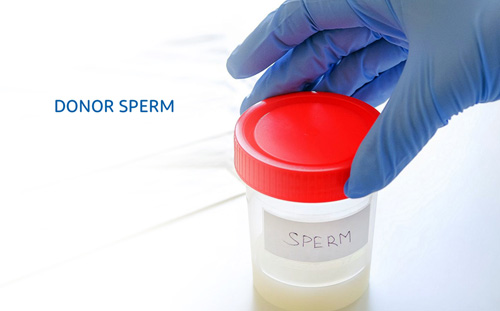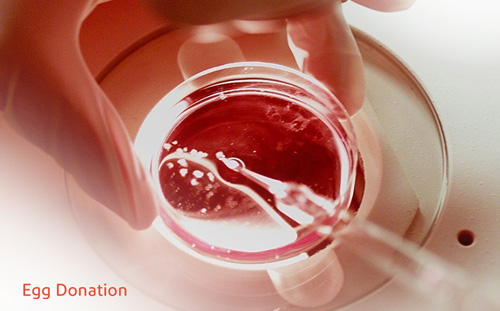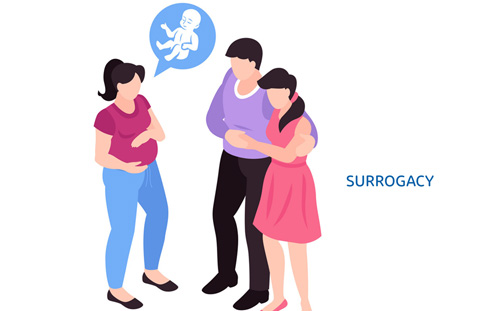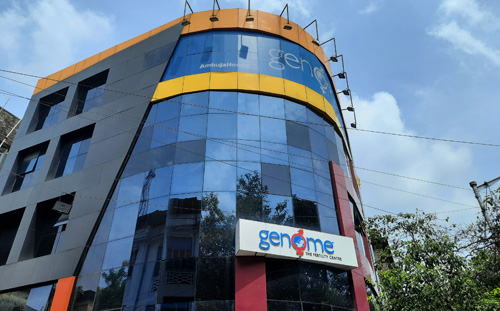Third Party Reproduction
Third-party reproduction services refer to any assisted reproductive technology (ART) that involves a third-party contributor, such as a sperm or egg donor, surrogate, or gestational carrier. These services allow individuals or couples to overcome infertility or genetic barriers to reproduction and achieve pregnancy using donor eggs or sperm, or by using a surrogate or gestational carrier to carry their child.
Here are some examples of third-party reproduction services:
- Donor sperm: Donor sperm can be used to fertilize a woman's egg through intrauterine insemination (IUI) or in vitro fertilization (IVF) to achieve pregnancy. (Available at genome)
- Donor eggs: Donor eggs can be used to create embryos, which are then implanted into the uterus of the intended mother or a surrogate to achieve pregnancy. (Available at genome)
- Surrogacy: Surrogacy involves a woman carrying a pregnancy for another person or couple who cannot conceive on their own. The surrogate may carry the intended parents' embryo or an embryo created using donor sperm or eggs. (not done at genome at present)
- Gestational carrier: A gestational carrier is similar to a surrogate, but she carries an embryo created using the intended parents' sperm and eggs or donor sperm and eggs. (not done at genome at present)
Third-party reproduction services can provide hope and options for individuals and couples who are struggling with infertility, same-sex couples, or single parents who want to have a biological child. However, there are legal and ethical considerations involved in third-party reproduction, and it's important to carefully consider all of the options and potential risks before pursuing these services.
Genome has superlative Compliance to standards set in Third Party Reproduction by way of vertical integration with in-house State-of-the-Art facilities of ART bank to cater to – Egg Donation & Sperm Donation services. However, the third party's involvement is limited to proving the gametes for the reproductive process and does not extend into the raising of the child. In line with the principles underlying the ICMR guidelines, the ART Bank guidelines as per Government and GENOME’s legal and ethical framework representing the very context and ethos of its services, Third Party Reproductive Services comprising of Egg Donation Services & Semen Donation Banking are provided to the intending couples.
Semen/Sperm donation
A semen donor provides sperm, which is tested/prepared and cryo-preserved, that can be used for insemination of the future mother or to fertilize an ovum for re-insertion of the resulting embryo into the mother, or by embryo transfer into a surrogate mother.
What is sperm donation?
Sperm donation is the process of donating sperm for the purpose of fertilizing a woman's egg to achieve a pregnancy. Sperm donation can help individuals or couples who are struggling with infertility, same-sex couples, or single women who want to conceive a child using a sperm donor.
Who can donate sperm?
Donors are typically screened for eligibility, which may include a physical exam, genetic testing, and a review of medical and family history. The sperm is also screened for infectious diseases, including HIV and hepatitis.
How is sperm donation done?
Sperm donation typically involves producing a semen sample in a private room at the clinic. The sperm sample is then processed, screened, and stored before being used in fertility treatments such as intrauterine insemination (IUI) or in vitro fertilization (IVF).
What happens to the donated sperm?
Once a sperm donor donates their sperm, it goes through a series of processes to ensure that it is suitable for use in fertility treatments. Here is an overview of what happens to donated sperm:
- Collection: The sperm donor provides a semen sample, usually through masturbation, in a private room at the clinic.
- Processing: The semen sample is processed to separate the sperm from the seminal fluid. This is usually done through a process called sperm washing, which removes the seminal fluid and any potential contaminants from the sperm.
- Analysis: The sperm is analyzed to determine its quality, including the count, motility (ability to swim), and morphology (shape).
- Freezing: The sperm is frozen and stored in liquid nitrogen at a very low temperature until it is needed for a fertility treatment.
- Thawing: When the sperm is needed for a fertility treatment, it is thawed and prepared for use by the fertility clinic.
- Insemination: The thawed sperm is then used in a fertility treatment such as intrauterine insemination (IUI) or in vitro fertilization (IVF).
Throughout this process, the sperm is carefully monitored and screened for infectious diseases, including HIV and hepatitis. This ensures that the sperm is safe to use and reduces the risk of transmitting diseases to the recipient or any resulting children.
Overall, donated sperm goes through a rigorous screening and processing process to ensure that it is of high quality and safe for use in fertility treatments.
What are the legal and ethical considerations surrounding sperm donation?
Sperm donation is done anonymously. The clinic in-charge and counsellors discuss all legal and ethical considerations surrounding sperm donation before carrying out the process along with all duly written consent.
How can someone become a sperm donor?
The process of becoming a sperm donor typically involves several steps, including eligibility screening, semen analysis, and signing a consent form. Here are the general steps to becoming a sperm donor:
- Eligibility screening: To become a sperm donor, you will need to meet certain eligibility criteria as per the clinic. These criteria usually include being between the ages of 18 and 40, having good general health, and having no significant medical or genetic issues in your family history.
- Semen analysis: If you meet the initial eligibility criteria, you will need to provide a semen sample for analysis. The semen will be tested for various factors, including sperm count, motility, and morphology. The results of the semen analysis will determine if you are a suitable candidate for sperm donation.
- Additional testing: If you pass the semen analysis, you may need to undergo additional testing, such as genetic testing or screening for infectious diseases, to ensure that your sperm is safe for use in fertility treatments
- Sign consent forms: If you meet all of the eligibility criteria and pass all of the necessary testing, you will be asked to sign consent forms. These forms will outline the terms of your donation, including any compensation you may receive and your rights and responsibilities as a donor.
- Donate sperm: Once you have signed the consent forms, you can begin donating sperm. This usually involves producing a semen sample in a private room at the clinic. The sperm will be processed and frozen until it is needed for a fertility treatment.
Egg/Ovum donation
An egg donor is a woman who donates her eggs to help another woman who is unable to conceive on her own.
What is egg donation?
Egg donation is a process in which a woman donates her eggs to help another woman who is unable to conceive a child on her own. The process involves retrieving eggs from the donor's ovaries through a minor surgical procedure and then fertilizing them with sperm in a laboratory. An egg donor provides only the ova for fertilization in the IVF process. The embryo is placed into the uterus/womb of the future mother (embryo transfer). The resulting embryos can then be transferred to the recipient's uterus or frozen for later use. Egg donation is typically used in cases where the recipient has a medical condition that prevents her from producing viable eggs.
Who can donate egg?
Donors are typically screened for eligibility, which may include a physical exam, genetic testing, and a review of medical and family history. The donor is also screened for infectious diseases, including HIV and hepatitis. Egg donors are typically between the ages of 21 and 35 and are in good health. They may choose to donate their eggs for a variety of reasons, including a desire to help others, a personal connection to infertility, or for financial compensation.
How is egg donation done?
The process of becoming an egg donor involves several steps, including an initial screening to determine if the donor is a good candidate, fertility medications to stimulate egg production, and a minor surgical procedure to retrieve the eggs. The eggs are then fertilized in a laboratory and used for in vitro fertilization (IVF) or frozen for later use.
What happens to the donated egg ?
When a woman donates her eggs, they are retrieved through a minor surgical procedure called transvaginal ultrasound-guided egg retrieval. The retrieved eggs are then fertilized with sperm in a laboratory using a technique called in vitro fertilization (IVF).
After fertilization, the resulting embryos are cultured in the laboratory for several days to allow for further development. The best quality embryos are then selected for transfer to the recipient's uterus, with the goal of achieving a successful pregnancy.
If there are extra embryos that are not immediately used, they may be frozen for later use in a process called cryopreservation. The frozen embryos can be thawed and transferred to the recipient's uterus at a later time, giving them additional chances of achieving a successful pregnancy without requiring the donor to undergo another egg retrieval procedure.
What are the legal and ethical considerations surrounding egg donation?
Egg donation is a highly regulated process that involves extensive screening of both the donor and the recipient to ensure the safety and ethical standards are met. Donors typically receive compensation for their time and effort in undergoing the process, but it is important to note that egg donation should be considered a serious medical decision and not solely for financial gain.
How can someone become an egg donor?
It's important to note that the process of egg donation, fertilization, and embryo transfer is complex and involves careful medical supervision and ethical considerations. Egg donation is strictly regulated to ensure the safety and well-being of both the donor and the recipient, and donors should fully understand the process and its potential risks and benefits before deciding to donate their eggs.
To become an egg donor, there are several steps involved. The specific requirements and procedures may vary depending on your visit and assessment by the clinic in charge and counsellors, but here are the general steps involved:
- Meet the basic requirements: Generally, egg donors must be between the ages of 21 and 35, in good health, and have a BMI within a certain range. They should also have regular menstrual cycles and not have any significant medical or genetic conditions.
- Apply: You can apply to become an egg donor at genome fertility centre. The application process typically involves filling out a detailed questionnaire about your medical history, lifestyle, and personal information.
- Initial screening: If your application is accepted, you will likely be asked to undergo an initial screening, which may include blood tests, physical exams, and genetic testing. You may also be asked to provide a family medical history.
- Psychological evaluation: You may be asked to undergo a psychological evaluation to ensure that you are mentally and emotionally prepared for the process of egg donation.
- Legal and financial counseling: You will likely receive legal and financial counseling to fully understand the legal and financial implications of egg donation.
- Sign consent forms: If you meet all of the eligibility criteria and pass all of the necessary testing, you will be asked to sign consent forms. These forms will outline the terms of your donation, including any compensation you may receive and your rights and responsibilities as a donor.
- Egg retrieval: If you are selected to be an egg donor, you will undergo a series of fertility medications to stimulate your ovaries to produce multiple eggs. The eggs will then be retrieved through a minor surgical procedure called transvaginal ultrasound-guided egg retrieval.
It's important to note that becoming an egg donor is a serious medical decision, and it's important to carefully consider the risks and benefits before deciding to proceed. If you are interested in becoming an egg donor, you can speak with our fertility specialist to learn more about the process and determine if it's the right choice for you.
If you are interested in becoming an egg donor, you can fill up the below form for egg donation at genome and contact us for more information.
Gestational carrier/Surrogacy
A woman carries a baby through the pregnancy for another person. This involves the use of IVF as the embryo is implanted by embryo transfer. Surrogacy/Gestational carrier services at presently is not done at genome.
** Surrogacy/Gestational Carrier Services at presently is not done at Genome - The Fertility Centre.
Service Excellence
Third-party reproduction services can provide hope and options for individuals and couples who are struggling with infertility, same-sex couples, or single parents who want to have a biological child. However, there are legal and ethical considerations involved in third-party reproduction, and it's important to carefully consider all of the options and potential risks before pursuing these services.
Genome has superlative Legal and Ethical Compliance standards set in Third Party Reproduction by way of vertical integration with in-house State-of-the-Art facilities as a Govt recognised ART bank to cater to – Egg Donation & Sperm Donation services. However, the third party's involvement is limited to proving the gametes for the reproductive process and does not extend into the raising of the child. In line with the principles underlying the ICMR guidelines, the ART Bank guidelines as per Government and GENOME’s legal and ethical framework representing the very context and ethos of its services, Third Party Reproductive Services comprising of Egg Donation Services & Semen Donation Banking are provided to the intending couples.
Infrastructure and Resources available at GENOME across all of its multiple centres – Equipments, Clinicians, Design Excellence through adoption of latest concepts in Healthcare Design, Infection Control and Sterility Zoning to achieve highest grade of Clean Air, Integration of Software to minimize manual errors, Clinical Software for Records Management/History/Tracking for clinical and legal requirements, etc.
GENOME has been a pioneer in the adoption of the latest design standards for Clean Rooms as per AHSRAE, JCI and NABH guidelines. All the new centres being planned along with the flagship Mother Centres would be established with State-of-the-Art technology in Air-Conditioning to achieve the desired levels of GRADE-A, Class-V of ISO 14644-1 Sterility as is recommended for such clinics on account of the superior HVAC Control with dedicated HEPA Filters and Laminar Flow and multiple grades of infrastructure zoning from Clean to Protected to Sterile. With the latest IT integration packages having been implemented, GENOME is in a position to ensure that each and every aspect of its service delivery is traceable and open for external and clinical audit on all the commitments of excellence it promises its patients.
Research into adoption of latest techniques to improve upon success rates – Controlled Stimulation Protocols, Ways to reduce OHSS (Ovarian Hyper-Stimulation Syndrome), Psychosomatic studies into Stress and effects of Stress after the procedure on Success Rates, Results of studies on Stimulation Protocol to Avoid Weekend Retrievals, etc.
Clinical Excellence by way of Research and Development with a dedicated faculty into Research, Clinical Trials and Training. With a vision of being recognized as a true “Centre of Excellence”, GENOME has been able to put in place an elaborate Training, Research and Development wing headed by very senior practitioners to delve deeper into the possible ways of improving and innovating on the various aspects of the clinical protocols. With a dedicated infrastructure to accommodate the Training and Research facilities, GENOME seeks to establish itself as the leading Institute in this domain over and above its position as an Excellent Service Provider.



